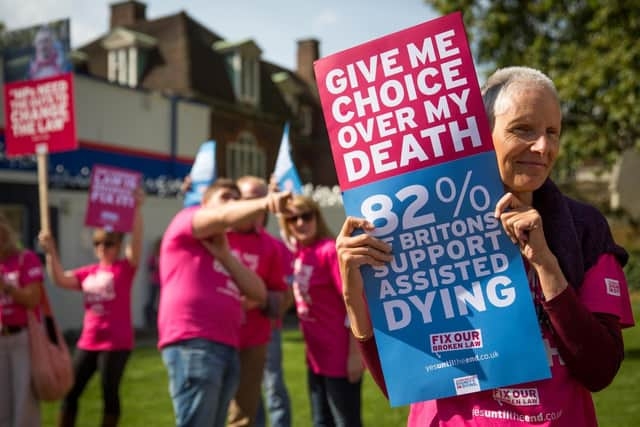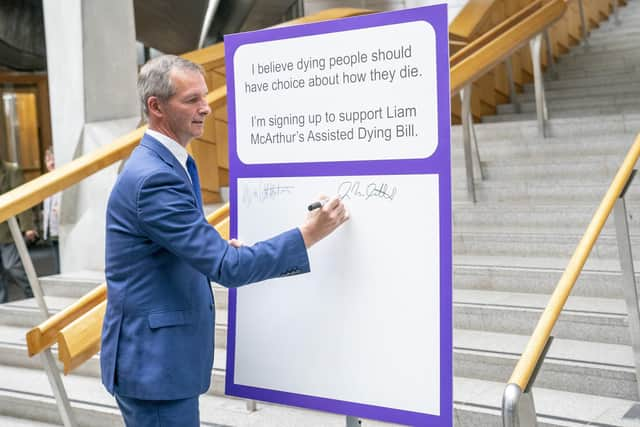MSP thinks there is enough support for general principle of Assisted Dying Bill


An MSP pushing to introduce assisted dying legislation in Scotland believes there could now be sufficient support for his Bill to pass its critical first vote at Holyrood.
Liberal Democrat Liam McArthur is the third MSP to attempt to pass such controversial legislation at the Scottish Parliament.
Advertisement
Hide AdAdvertisement
Hide AdWhile Holyrood has voted down previous attempts to give those who are terminally ill medical assistance to take their own life, Mr McArthur said the conditions now “seem to be right” for the Parliament to approve the general principle of such a change.


His Assisted Dying for Terminally Ill Adults (Scotland) Bill is now expected to be introduced to the Scottish Parliament in the “early part” of 2024 – with an initial vote on the general principles of the legislation then likely later in the year.
Mr McArthur said: “It’s one of those things where once we pass the legislation we will wonder why on earth it took us so long to get to this position.”
Speaking about his member’s Bill, the Orkney MSP said he accepted getting legislation through Holyrood “won’t be straightforward”, with proposals likely to come in for “robust scrutiny”. However, Mr McArthur said the Parliament could no longer simply “park” the issue of assisted suicide “in the ‘too difficult’ box”.
He said: “Yes, it’s difficult, yes, it is sensitive, people have very strong opinions on both sides. But we now know that there is overwhelming public support for this. We are seeing more and more instances of people being left in positions of going through undignified, intolerable deaths, or going down the route of taking matters into their own hands.”


Independent MSP Margo Macdonald brought forward similar proposals in 2010, with these rejected by 85 votes to 16 at stage one, while a subsequent attempt made by Green MSP Patrick Harvie to pass legislation was defeated by 82 votes to 36 in 2015.
With two Holyrood elections having taken place since then, Mr McArthur said about two-thirds of current MSPs had not yet had the opportunity to vote on the issue.
He said: “I think there is now a sense when I speak to colleagues, those who are still undecided do now appear to be looking for reasons to support rather than reasons to oppose, which was very much the feel last time round.”
Advertisement
Hide AdAdvertisement
Hide AdFor any Bill to become law, Holyrood has to first approve its general principles, before then considering the issues in more detail with amendments at stage two and stage three of the legislative process, before a final vote.


Mr McArthur said: “This time round Parliament really has a responsibility to see whether or not we can come up with a detailed Bill that commands that cross-party support, but public support and confidence as well. That requires us to get into the amending stages. I think there is majority support for the general principles of changing the law.
“I think there is strong majority acceptance that the status quo isn’t satisfactory or really sustainable, majority support, therefore, that we do really need to change the law.”
He argued that terminally-ill Britons travelling to clinics such as Dignitas in Switzerland means governments here “outsource” the issue of assisted dying, but said this meant those who could not afford to travel could be left with no option but to seek to “take matters into their own hands”.
He insisted “the status quo is not sustainable”, saying this is “leading to too many people being left in a position which is intolerable”.
While his Bill has not yet been introduced to the Scottish Parliament, the consultation for it suggested two doctors would be required to certify a person is terminally ill, with two doctors also having to agree they have the mental capacity required to request an assisted death, and that they are making an “informed decision without pressure or coercion”.
A “reflection period” would then take place before a doctor would prescribe the necessary medication, which the person would have to be able to take themselves.
However, the proposals have already sparked controversy. Labour's Pam Duncan-Glancy, a permanent wheelchair user, called the plans "dangerous for disabled people".
Advertisement
Hide AdAdvertisement
Hide AdMr McArthur previously told The Scotsman he has had a "lengthy conversation with Pam", adding: "I'm not necessarily convinced that I'm going to be able to persuade her to change a position she's had on this issue for many, many years. I think what I'm more keen to do is understand the basis of the concerns she has, and make sure that as far as possible those can be addressed in the framing of the legislation."
First Minister Humza Yousaf has also raised concerns following talks with disability campaigners. “My view has always been to be open minded to the discussion, but I have not been persuaded and I feel even less persuaded after a recent discussion with the Glasgow Disability Alliance,” he said in September.
Religious leaders have long expressed their opposition, but last year the Church of Scotland voted to review its position.
UK Labour leader Keir Starmer recently said he believes there are “grounds for changing the law” on assisted dying. Meanwhile, last summer, the Royal College of Surgeons changed its position from opposition to neutrality.
With powers over the drugs to be used reserved to Westminster under Misuse of Drugs legislation, Mr McArthur has been in contact with the Scotland Office about this and other areas of his Bill.
He added that these “initial conversations” had been constructive, with the MSP saying: “They welcomed the fact that I was approaching them early in the process.”
Comments
Want to join the conversation? Please or to comment on this article.